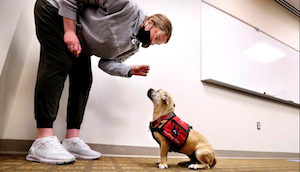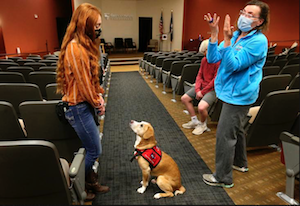Shenandoah University in Virginia has launched an intriguing new program that pairs psychology students with shelter dogs for lessons in behavior modification techniques.

A very special behavioral psychology course has 19 students currently learning first-hand how patience, positive reinforcement and praise can overcome bad behaviors.
Dr. Rodney Bragdon, an associate professor at Shenandoah University who is overseeing the Psychology 330: Behavior Modification course with assistance from professional dog trainer Lisa Marino states “It’s really the same principles whether you apply them to animals or humans. What we’re really doing is looking for the consequences of behavior and trying to manipulate those consequences to get the desired behavior that we want.”
He explained that “dogs and humans alike respond better to praise than punishment. While a dog’s good behavior should be rewarded with treats and a scratch behind the ears, a child’s good behavior should be reinforced with hugs and compliments. “When a kid’s playing nice, make sure you give them attention and praise,” Bragdon said. “When they’re acting out, don’t give them that attention. You’ll find that they’re going to start acting the way you want them to if you give them the reinforcement that they’re after.”
The Psychology course students split into five groups and led each pup into a private classroom to minimize distractions while teaching the dogs skills like sit, shake and heel. Marino, a former middle school teacher, initially watched the students as they issued commands and handed out treats. “For the first month, I came to most classes,” Marino said about teaching the students to teach the dogs. “They’ve had more time to work on their own, so this is the first time I’ve been here in two or three weeks.” She was impressed by what she saw.
 “The beauty behind this service learning project is that students are getting to apply course concepts — hands-on practice, which most students love because it’s better than just sitting in a classroom — and we also get to provide a meaningful service to the community,” Bragdon said. “There’s very clear research that shows if a shelter dog can learn even one obedience command, their chances of adoption go way up. It’s kind of a win-win.”
“The beauty behind this service learning project is that students are getting to apply course concepts — hands-on practice, which most students love because it’s better than just sitting in a classroom — and we also get to provide a meaningful service to the community,” Bragdon said. “There’s very clear research that shows if a shelter dog can learn even one obedience command, their chances of adoption go way up. It’s kind of a win-win.”
Making dogs a full-time component of the program is a new development this semester that became possible thanks to SU’s decision in August to allow students to keep pets in two of its dormitories. ”They don’t have to be service animals, they don’t have to be emotional support animals,” Bragdon said. “Students can just have a dog if they want a dog.” That policy change opened the door for some of the current Psychology Course students to become roommates with four shelter dogs.
According to Dr Bragdon, “There are a lot of undergraduate psychology programs across the nation, but the psychology program here really values hands-on learning. We’re constantly looking for opportunities for students to actually apply the principles and the techniques and the skills instead of just sitting in a classroom and talking about it. You can’t engage in a project like this and come out the other end not having learned anything.”
[Link]
